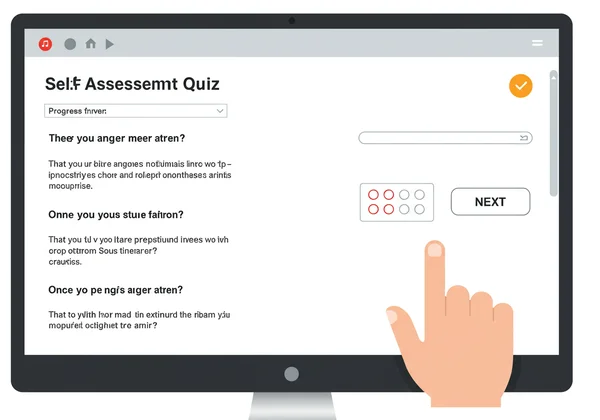Test sul Disturbo Esplosivo Intermittente: La Tua Guida all'Autovalutazione
July 13, 2025 | By Sophia Galloway
Le esplosioni improvvise e intense di rabbia ti fanno sentire sopraffatta/o e insicura/o? Se ti sei mai chiesta/o, "Sto vivendo un IED?" o hai sentito la tua rabbia esplodere senza preavviso, sappi che non sei sola/o. Sebbene gestire emozioni intense possa essere isolante, il supporto è disponibile. La nostra valutazione online gratuita e confidenziale offre un primo passo privato per comprendere i tuoi schemi di rabbia e se sono in linea con il Disturbo Esplosivo Intermittente. Questa guida ti accompagnerà nel processo, ti spiegherà il significato dei tuoi risultati e i passi cruciali successivi per trovare chiarezza e supporto. Pronta/o a iniziare il tuo percorso di comprensione? Inizia la tua valutazione.

Comprendere la Rabbia Esplosiva: È Più di un Semplice "Temperamento Collerico"?
Molte persone provano rabbia, ma per alcune essa si manifesta come esplosioni improvvise, incontrollabili e sproporzionate. Questo tipo di rabbia intensa, spesso seguita da sentimenti di colpa o vergogna, può essere incredibilmente dirompente. È più che avere un "temperamento collerico"; potrebbe indicare un problema sottostante più complesso. Comprendere questa distinzione è fondamentale per trovare il giusto supporto e ottenere chiarezza.
Riconoscere i Segni: Come si Presenta il Disturbo Esplosivo Intermittente
Il Disturbo Esplosivo Intermittente (IED) è un disturbo comportamentale caratterizzato da esplosioni comportamentali ricorrenti che rappresentano un fallimento nel controllare gli impulsi aggressivi. Queste esplosioni sono tipicamente sproporzionate rispetto alla provocazione o al fattore di stress. Possono includere aggressività verbale (ad es. capricci, sfuriate, litigi) o aggressività fisica (ad es. danneggiare proprietà, aggressione fisica), verificandosi frequentemente e causando significativo disagio o compromissione. Identificare questi segni di IED può essere difficile, poiché potrebbero essere confusi con lo stress o altre condizioni. Tuttavia, la chiave risiede nella loro natura ricorrente, impulsiva e sproporzionata, insieme al disagio che causano.
L'Impatto della Rabbia Incontrollata sulla Tua Vita e sulle Tue Relazioni
L'impatto delle esplosioni di rabbia da condizioni come l'IED può ripercuotersi su ogni aspetto della vita. Personalmente, gli individui provano spesso profonda colpa, vergogna e autocritica dopo un episodio. Professionalmente, queste esplosioni possono compromettere le carriere, portando alla perdita del lavoro o a dinamiche lavorative tese. Socialmente, amici e familiari potrebbero allontanarsi, temendo reazioni imprevedibili, il che può portare all'isolamento e alla solitudine. Gli effetti dell'IED sulle relazioni sono particolarmente devastanti, erodono la fiducia e causano un significativo dolore emotivo a tutte le persone coinvolte. Riconoscere questo impatto sottolinea l'urgenza di cercare aiuto.

Perché Considerare un'Autovalutazione del Disturbo Esplosivo Intermittente?
Fare un passo verso l'autovalutazione potrebbe sembrare scoraggiante, ma è un potente modo per prendersi cura di sé. Un test per il disturbo esplosivo intermittente come il nostro offre un modo confidenziale e accessibile per iniziare a esplorare i tuoi schemi di rabbia senza pressione immediata o giudizio. È uno strumento progettato per offrire spunti preliminari, fornendoti informazioni per guidare i tuoi prossimi passi. Non si tratta di diagnosi, ma di ottenere chiarezza.
Confidenzialità e Convenienza: Un Primo Passo Privato
Uno dei maggiori vantaggi di un'autovalutazione IED online è la privacy e la convenienza impareggiabili che offre. Puoi fare questo test anonimo sulla rabbia nel comfort di casa tua, in qualsiasi momento ti sembri opportuno. Non c'è bisogno di appuntamenti, sale d'attesa, solo uno spazio privato per riflettere sulle tue esperienze. Questa valutazione IED privata ti permette di raccogliere spunti iniziali alle tue condizioni, rendendola un primo passo veramente accessibile per coloro che lottano con emozioni difficili.
Ottenere Chiarezza: Superare l'Autodubbio e la Confusione
Per molti, la domanda persistente "Cosa c'è che non va in me?" o "Perché non riesco a controllarlo?" porta a un significativo autodubbio. Un'autovalutazione della rabbia può fornire una struttura a questi pensieri, aiutandoti a comprendere i problemi di rabbia in modo più obiettivo. Rispondendo a una serie di domande attentamente formulate, inizi a collegare schemi e comportamenti che potresti non aver riconosciuto. Questo processo può fornire preziosi spunti iniziali sull'IED, guidandoti dalla confusione a una più chiara comprensione dei tuoi schemi emotivi.
Navigare il Nostro Test IED Gratuito: La Tua Guida Passo Dopo Passo
Intraprendere il test sul disturbo esplosivo intermittente è un processo semplice e di supporto, progettato pensando al tuo comfort. Il nostro obiettivo è rendere questo primo passo il più accessibile e informativo possibile. Questa guida ti accompagnerà in ogni fase, assicurandoti di sentirti preparata/o e sicura/o nell'utilizzare il nostro prezioso strumento online.
Iniziare la Tua Valutazione Online della Rabbia
Per iniziare la valutazione IED sulla nostra piattaforma, visita semplicemente la nostra homepage. Troverai istruzioni chiare e un pulsante ben visibile per iniziare. La valutazione consiste in una serie di domande progettate per aiutarti a riflettere sulle tue esperienze di rabbia, inclusa la loro frequenza, intensità e impatto. Ricorda, non ci sono risposte giuste o sbagliate; le risposte più preziose sono quelle oneste. Questa funzionalità di test online sulla rabbia è costruita per essere facile da usare, permettendoti di procedere al tuo ritmo. Se sei pronta/o a esplorare, fai clic per iniziare la tua valutazione.

Interpretare i Tuoi Risultati e Cosa Significano per Te
Una volta completato il questionario, riceverai risultati immediati. Questi risultati forniscono un riassunto delle tue risposte, evidenziando schemi che potrebbero essere coerenti con gli indicatori del test di rabbia esplosiva. È importante ricordare che questa funzionalità di spiegazione dei risultati del test IED offre spunti preliminari e non è una diagnosi clinica. Il report è progettato per aiutarti a comprendere i risultati dell'autovalutazione, offrendoti un quadro più chiaro dei tuoi schemi di rabbia. Per un report personalizzato più dettagliato, generato dall'IA, puoi scegliere di fornire un contesto aggiuntivo. Questo report può servire come un prezioso punto di partenza per discussioni con un professionista della salute mentale.
I Tuoi Prossimi Passi Dopo la Valutazione IED
Ricevere i risultati del tuo test sul disturbo esplosivo intermittente è un passo avanti significativo. Fornisce una base di comprensione, ma è fondamentale sapere cosa fare dopo. Il nostro obiettivo è darti la forza di intraprendere passi proattivi per gestire la tua rabbia e migliorare il tuo benessere. Ciò potrebbe includere l'esplorazione di supporto professionale o risorse aggiuntive.
Connettersi con un Professionista della Salute Mentale
Se la tua autovalutazione suggerisce schemi coerenti con l'IED, il passo successivo più importante è cercare aiuto professionale per la rabbia. Solo un professionista qualificato della salute mentale può fornire una diagnosi formale di IED. Possono offrire una valutazione completa, esplorare le cause sottostanti e sviluppare un piano di trattamento personalizzato, su misura per le tue esigenze specifiche. Trovare un terapeuta per la rabbia o uno psichiatra può aprire le porte a strategie efficaci e supporto, portando a una vita emotiva più sana e stabile. Considera di contattare un professionista per discutere i tuoi risultati e saperne di più sulle opzioni di trattamento.

Esplorare Risorse per Gestire il Disturbo Esplosivo Intermittente
Oltre all'aiuto professionale, ci sono numerose strategie di coping per l'IED e risorse per la gestione della rabbia disponibili per supportarti. Il nostro sito web, una risorsa completa per il Disturbo Esplosivo Intermittente, è un centro di informazioni, che offre articoli sulla comprensione dell'IED, tecniche di gestione della rabbia e guida su come supportare i propri cari che potrebbero avere difficoltà. Ti incoraggiamo a esplorare le nostre diverse pagine per approfondimenti e strumenti pratici. L'educazione è uno strumento potente nella gestione di qualsiasi condizione, e comprendere il Disturbo Esplosivo Intermittente può darti la forza di prendere decisioni informate sul tuo benessere. Sfoglia il nostro sito per altre risorse utili.
Fare il Primo Passo: Abbracciare Chiarezza e Supporto
Fare il passo per comprendere la tua rabbia è incredibilmente coraggioso. Il nostro test sul disturbo esplosivo intermittente gratuito e confidenziale è progettato per essere un punto di partenza sicuro e accessibile, offrendo spunti iniziali sui tuoi schemi di rabbia. Ricorda, questa autovalutazione fornisce una comprensione preliminare, non una diagnosi. Il tuo passo successivo più importante è connetterti con un professionista della salute mentale per supporto personalizzato e guida esperta. Non devi affrontare tutto questo da solo/a; la chiarezza e il supporto efficace sono a portata di mano. Riprendi il controllo del tuo benessere emotivo oggi stesso – inizia la tua autovalutazione e inizia il tuo percorso in avanti.
Domande Frequenti sull'Autovalutazione del Disturbo Esplosivo Intermittente
Come faccio a sapere se ho l'IED?
Mentre solo un professionista qualificato della salute mentale può diagnosticare il Disturbo Esplosivo Intermittente, un'autovalutazione online come la nostra può fornire spunti iniziali. Ti aiuta a verificare se i tuoi schemi di rabbia corrispondono alle caratteristiche comuni dell'IED, come esplosioni ricorrenti e sproporzionate. Fare la nostra valutazione gratuita della rabbia è un ottimo primo passo per comprendere le tue esperienze.
Come ci si sente con l'IED?
Le persone con Disturbo Esplosivo Intermittente spesso descrivono un'intensa tensione fisica ed emotiva che aumenta prima di un'esplosione, seguita da un senso di sollievo durante l'esplosione, e poi da profondo rimorso, vergogna o colpa in seguito. Si sente come perdere il controllo, spesso inaspettatamente.
L'IED peggiora con l'età?
Senza trattamento, il Disturbo Esplosivo Intermittente può persistere e potenzialmente peggiorare nel tempo, portando a un crescente deterioramento delle relazioni, del lavoro e della qualità generale della vita. L'intervento precoce e la gestione continua sono cruciali per ottenere risultati migliori.
Cosa succede se l'IED non viene trattato?
Se il Disturbo Esplosivo Intermittente non viene trattato, può portare a gravi conseguenze, tra cui relazioni danneggiate, perdita del lavoro, problemi legali, difficoltà finanziarie e un aumento del rischio di altre condizioni di salute mentale come depressione e ansia. Cercare aiuto professionale attraverso risorse trovate su siti come IntermittentExplosiveDisorder.com è vitale per la prevenzione e il recupero.